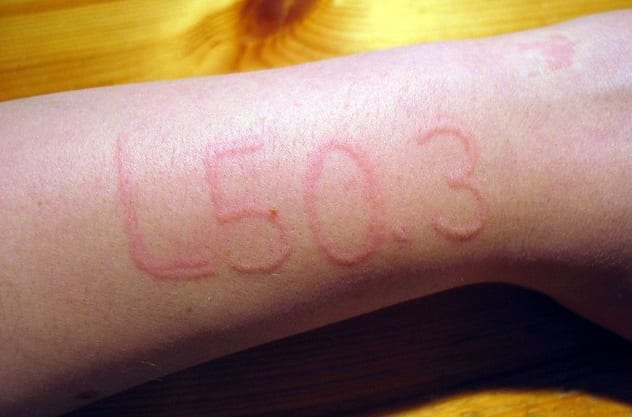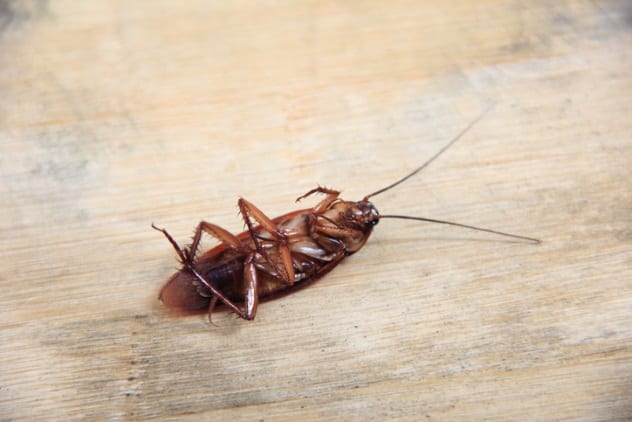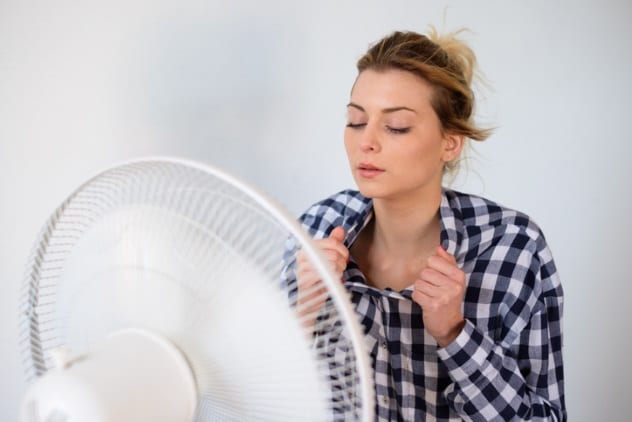 Miscellaneous
Miscellaneous  Miscellaneous
Miscellaneous  Animals
Animals 10 Strange Attempts to Smuggle Animals
 Travel
Travel 10 Natural Rock Formations That Will Make You Do a Double Take
 Movies and TV
Movies and TV 10 Actors Hidden in Your Favorite Movies
 Our World
Our World 10 Science Facts That Will Change How You Look at the World
 Pop Culture
Pop Culture 10 Incredible Female Comic Book Artists
 Crime
Crime 10 Terrifying Serial Killers from Centuries Ago
 Technology
Technology 10 Hilariously Over-Engineered Solutions to Simple Problems
 Miscellaneous
Miscellaneous 10 Ironic News Stories Straight out of an Alanis Morissette Song
 Politics
Politics 10 Lesser-Known Far-Right Groups of the 21st Century
 Miscellaneous
Miscellaneous 10 Undeniable Signs That People’s Views of Mushrooms Are Changing
 Animals
Animals 10 Strange Attempts to Smuggle Animals
 Travel
Travel 10 Natural Rock Formations That Will Make You Do a Double Take
Who's Behind Listverse?

Jamie Frater
Head Editor
Jamie founded Listverse due to an insatiable desire to share fascinating, obscure, and bizarre facts. He has been a guest speaker on numerous national radio and television stations and is a five time published author.
More About Us Movies and TV
Movies and TV 10 Actors Hidden in Your Favorite Movies
 Our World
Our World 10 Science Facts That Will Change How You Look at the World
 Pop Culture
Pop Culture 10 Incredible Female Comic Book Artists
 Crime
Crime 10 Terrifying Serial Killers from Centuries Ago
 Technology
Technology 10 Hilariously Over-Engineered Solutions to Simple Problems
 Miscellaneous
Miscellaneous 10 Ironic News Stories Straight out of an Alanis Morissette Song
 Politics
Politics 10 Lesser-Known Far-Right Groups of the 21st Century
10 Allergies You Never Thought Could Exist
You’ve probably heard of many different kinds of allergies that plague people internationally. More than 50 million people suffer from them in the United States alone.[1] From tree nut to shellfish allergies, these afflictions can become incredibly dangerous if not handled with care. It’s more than likely someone in your family or friend group has had to see an allergy doctor. Usually, they’re made to carry about an Epi-Pen, or the more recent Auvi-Q, just in case of a severe allergic reaction. The worst allergic reactions can send people into anaphylactic shock, involving shortness of breath, vomiting, fainting, low blood pressure, and even the possibility of death.
Yet, there are still many allergies that are not among the ones you always hear about—ones that seem so random that it makes you wonder where they came from. Maybe you personally have dealt with one of these or know someone with one. While food allergies tend to be more common, a lot of these uncommon ones are known as physical urticarias, which is a fancy way of saying the allergen causes itchy, red hives and rashes on the skin. Physical urticarias tend to have to do with physical stimulants—heat, cold, exercise, and many others. Beyond that, there are other allergies to everyday objects that seem like they’d impede one’s ability to live normally. This is a list of ten of those allergies—ones you never even thought could exist.
10 Cold Urticaria

Commonly known as an allergy to the cold, this affliction causes those allergic to it to break out in hives due to temperature drops. For some, all it takes is diving into a freezing-cold pool to set them off into anaphylaxis. This allergy can become quite dangerous really quickly. Cold exposure leads to the development of itchy rashes and hives.[2] The reactions to the cold can vary, from very minor hives-based reactions to full-on fainting and shock. Swelling of the tongue or throat is also possible in this allergy.
Usually, this allergy occurs more often in young adults and can be the result of an underlying health condition. It also can be genetic, so multiple people in the same family might have it. Despite this, it still can be treated with over-the-counter allergy medication.
9 Dermographism

A reaction which only affects around four percent of the population is dermographism, which can be seen as being allergic to touch. That sounds wild, but you’ve probably seen the effects of this one before if you’re active on the Internet. It allows those afflicted to pretty much write words on their skin with their fingernail and have them stay visible.
The word “dermographism” essentially means “skin writing.”[3] In reality, it’s a rash that appears due to touch and that eventually will go away within a half-hour. Dermographism can also be controlled with antihistamines, which can help deal with the irritation of the hives.
8 Solar Urticaria

Another physical urticaria, this allergy causes people to develop hives when exposed to natural sunlight.[4] This definitely would be tough for summer people, as it’d make going out in the sun quite difficult. A reaction can also develop from an artificial light source that’s emitting UV rays. This affliction is very rare as a whole but does seem to start most commonly in one’s mid-thirties.
Mostly, people with this issue can avoid allergic reactions by using sun protection strategies or by taking antihistamines. The goal should be to minimize sun exposure and prevent rashes from appearing. In addition, patients can sometimes undergo phototherapy or photochemotherapy, which can help them become used to sun exposure, especially if their allergy is really severe and makes life extremely difficult.
7 Exercise Allergy

Exercising is hard enough without having to worry about going into anaphylaxis. Unfortunately, some people can have severe allergic reactions simply from exercising too much. In these situations, they can go into anaphylaxis after going to the gym or partaking in other types of physical activity. Interestingly enough, there are different factors that can play into this reaction, including food, medications, and weather conditions. Sometimes, eating certain foods before going out to exercise can lead to anaphylaxis, which is known as food-dependent exercise-induced anaphylaxis.[5]
This condition can come on unexpectedly and can become so severe as to be lethal. Even so, it’s still possible to treat it with epinephrine.
6 Aquagenic Urticaria

Some people wonder if water’s wet, while others question whether water allergies are a legitimate thing. There’s still no solid answer to the first question, but it’s been shown that water allergies are real. Scientifically known as aquagenic urticaria, this allergy can cause a hives reaction when someone afflicted goes into water.[6] This sounds unbelievable, since we are constantly surrounded and mainly made up of water.
Doctors still aren’t sure how exactly this allergy came about, but similar to the other physical urticarias, it can be treated with antihistamines.
5 Cockroach Allergy
 Cockroaches are gross enough without also being allergens. For an unfortunate few, however, being allergic to them is a real thing to deal with. Usually, it leads to asthmatic symptoms due to the proteins that come off the cockroaches’ bodies.[7] A way to deal with such an allergy is by keeping one’s home clean and getting rid of any dead cockroaches because even they can cause an allergic reaction. Surprisingly, people who are allergic to shellfish can sometimes also be allergic to cockroaches, as they give off a similar protein.
Cockroaches are gross enough without also being allergens. For an unfortunate few, however, being allergic to them is a real thing to deal with. Usually, it leads to asthmatic symptoms due to the proteins that come off the cockroaches’ bodies.[7] A way to deal with such an allergy is by keeping one’s home clean and getting rid of any dead cockroaches because even they can cause an allergic reaction. Surprisingly, people who are allergic to shellfish can sometimes also be allergic to cockroaches, as they give off a similar protein.
People with a cockroach allergy can even find themselves with hives simply from touching a place where a cockroach walked or pooped. On the upside, it gives people with this allergy even more reason to avoid cockroaches at all costs.
4 Artificial Nail Allergy

Artificial nails are quite popular and trendy. They look cute and come in all different shapes, sizes, and colors. Getting your nails done is something fun to do, but for some people, it can lead to complications. For some, the adhesives cause swelling, redness, and pain at the nail beds.[8]
The cause of these symptoms is an allergy to the chemical ethyl methacrylate monomer. It’s often used in acrylic nails and is FDA-approved. It’s better for people with this allergy to stick to easier, simple nail polish or even go bare rather than suffer the effects of such an allergy.
3 Nickel Allergy

Change, in general, tends to be annoying for most people—what can you even do with a bunch of coins? For some, it goes farther than just that. In particular, people with nickel allergies cannot hold coins high in nickel content without getting a bad rash and itching. Sometimes, blisters can even appear and last for weeks.[9] This goes for more than just simple coins—people with nickel allergies might have trouble wearing jewelry containing the metal. It can become problematic, especially when trying to buy something cute to wear with an outfit.
This condition is a lot more common in females and in people with other sensitivities to metals. The best way to deal with it is by simply avoiding prolonged exposure to the metal, so as to not have such a negative reaction. Fortunately, hypoallergenic jewelry is made just for these types of situations.
2 Raw Fruit And Vegetable Allergy

While food allergies are common, raw fruit and vegetable allergies are a bit different. People afflicted cannot eat either raw fruits or veggies without having their throat begin to swell up. The allergic reaction can actually be quite severe. This allergy is also known as oral allergy syndrome, and some of the negatively impacting fruits can include pears, peaches, apricots, apples, kiwis, and many others. On the vegetable spectrum, the most common allergies are to celery, carrots, parsley, coriander, and more.[10]
The reason for such an allergy is related to hay fever and people who have trouble with pollen. It’s actually estimated that 70 percent of people with pollen allergies are susceptible to a raw fruit or vegetable allergy. The body recognizes a protein in certain raw fruits and vegetables as being similar to pollen molecules, causing the severe allergic reaction.
1 Sweat Allergy

Yes, you read that right. There are people in the world who genuinely are allergic to their own sweat. This condition, known as cholinergic urticaria, is due to an increase in body temperature, which usually results in sweating. People with this allergy can even suffer a reaction from a simple hot bath or spicy foods. Sufferers tend to only experience hives but can also feel fever-like symptoms and have trouble breathing when exposed to the allergen.
Similar to cold urticaria, the main cause for the allergic reaction is a change of temperature, this time from cold to hot. This would lead to a feeling of a heat rash and other negative symptoms.[11]
+ Allergy Medicine Allergy

Ironically, there are people who happen to be allergic to allergy medication. This can become extremely bothersome, especially when you’re attempting to treat another allergy, only to find yourself faced with twice as many issues as before. In reality, people aren’t allergic to the medication as a whole, just certain dyes and chemicals used in it. While the reaction to allergy medication can be so severe that it’s life-threatening, there are ways to treat this allergy by going to a professional. One way consists of being treated with allergy shots without any preservatives or dyes.[12] Still, this is probably the most annoying of all the allergies on the list and also the most frustrating.
There are still plenty of other allergies that are more or less common and create a lot of issues for people affected by them. This list only covered a few intriguing ones. So many people are affected by allergies, most of which can merely be treated, not cured. It’s important for people with allergies to stay safe—to keep their Epi-Pens on them and avoid exposing themselves to whatever might cause an allergic reaction. Although it sometimes sucks to have to deal with such irritating allergies, it’s the only way to keep everyone safe and healthy. Hopefully, with our current rate of technological advancement, research will reveal a way to cure allergies that have plagued the human race for centuries. In the meantime, all we can do is wait.
Julia is a college student inspired to write this because of her personal affliction of cold urticaria.
Read more about allergies on Top 10 Amazingly Strange Facts About Allergies and 10 Wacky Allergies To Things Other Than Foods.








